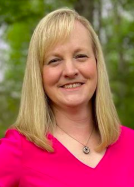One of the weekly joys of my job is leading preschool chapel with 3-, 4- and 5-year-olds from our Weekday Preschool. They come into the sanctuary full of awe, joy, wiggles, and giggles!
On Ash Wednesday, we talked about the beginning of Lent, looked for purple and crosses, said “I’m sorry” as we jumped and turned, and imposed COVID-safe crosses on ourselves remembering that we are all God’s children, and He loves us no matter what. As they were leaving, one 4-year-old boy asked me, “But, how did Jesus die?” I answered simply, “Well, he died on the cross.” Not quite satisfied with that, the boy said, “Yeah, but HOW did he die?”
It was an intimidating question, indeed. I needed to offer an answer that was truthful and factual, yet not too detailed or frightening. ”Well, he had some hurts on his body and he had been on the cross a long time, so his body was tired, and it stopped working.” That seemed to be enough to satisfy the child’s curiosity – for the time being.
We expect questions from children. In fact, we encourage it!
In chapel, we use a curriculum called Godly Play. Each lesson ends with wondering questions. “I wonder what part of this story is the most important?” “I wonder what part of this story you liked best?” “I wonder which person in this story is most like you?” The thing about wondering is that there is no set answer. There is not a right or wrong response. In fact, my mother, who taught high school English for 30 years would argue that those are not even questions that should be ended with a question mark. They are, in fact, statements and should be ended with a period – which would indicate that no answer or response is needed. Saying “I wonder” is not asking a question – it is stating a fact, just like “I run” or “I write.”
I wonder when and why that shifts to a point when wondering, questioning is sometimes considered a sign of doubtful, shaky faith.
During Lent, I have been reading Wholehearted Faith by Rachel Held Evans with our GRACE Bible study group. In the book that has been published posthumously, Held Evans recounts her faith journey from a very conservative evangelical childhood to a more grace-filled, wholehearted faith. She credits her parents’ willingness to entertain her questions despite their fundamentalist church life.
At one point in the book, Held Evans says, “. . . certainty isn’t faith. And faith is marked by the humility to let yourself question – which is not a shortcoming but an acknowledgement of one’s humanity.” She also quotes Anne Lamott who says, “The opposite of faith is not doubt, but certainty.” Held Evans adds, “If uncertainty is a marker of faith, then I must be pretty darn faithful.”
Isn’t that a comforting thought? The idea that having questions and uncertainty is actually a marker of faith, rather than one of disbelief, is freeing. When we give ourselves permission to ask questions and admit we don’t have all the answers, we create space to dive deeper into our faith and live into the mystery of God.
On staff, when we ask members to teach a class or lead a small group, we often hear something like, “I don’t think I’m qualified for that,” or “What if I’m not able to answer their questions?” The truth is that even those of us on staff can’t always answer the questions. We, too, are human and have questions as well. Instead, how about if we said, “I may not have all the answers, but I would love to explore those questions with you and see how the Holy Spirit deepens our faith – and our relationships – as we do that faithful work together.”
There’s a song I have always liked called “Faith Like a Child” by Jars of Clay. The chorus says:
They say that I can move the mountains
And send them falling to the sea
They say that I can walk on water
If I would follow and believe
With faith like a child
I pray that you might have faith like a child in preschool chapel, unafraid to share your curiosity and assured that someone who loves you will help you explore those questions as you grow in faith together.

